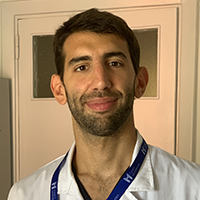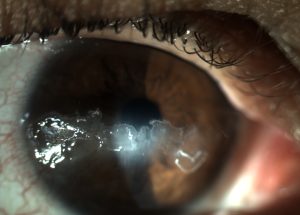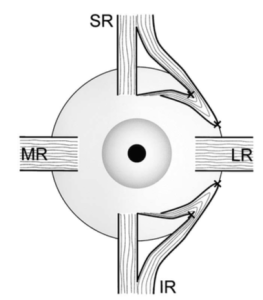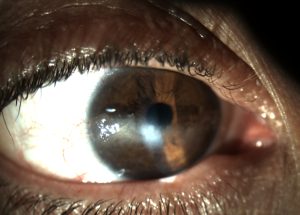Determination, passion and a specific focus are the essential elements to make your way in Ophthalmology, "an extraordinary branch".
The 'allologist' may have been fine in the past, but today it is essential to specialise in a specific branch of ophthalmology. This is explained to us very effectively by Dr Francesco Cerbella, who also describes an interesting case of ocular complications in a polytrauma patient following a fall.
How did you choose your training in Ophthalmology and what is your current professional profile?

I was born in 1991 and I come from Naples. Like many, I am a child of art: my father is an ophthalmologist like me, and my choice to practice first medicine and then ophthalmology was always conditioned by the passion that I saw him instil in his work and the satisfaction with which he still carries out his medical practice after 40 years.
Even though it might seem obvious when read like this, I was in the balance until the very end when it came to choosing a university, and it was a chance event that defined my final decision, an event that I interpreted almost as a sign of destiny: a friend of mine had an eye injury during a holiday in Greece at the end of school and I was very impressed by the figure of the colleague who helped him at the time, and I was enormously fascinated by his role as the 'solver' of the situation, the repository of our unconditional trust.
After specialising at the Luigi Vanvitelli University and a fruitful period at the Sacco Hospital in Milan, I was able to increasingly implement my medical knowledge and surgical skills thanks to a period of voluntary work at the S.M. delle Grazie Hospital in Pozzuoli. I finally landed at the Clinica Mediterranea, a well-established private hospital in Naples, where I work as a freelancer.
Can you tell us about an unusual or particularly complex clinical case that you managed to handle and solve?

I can tell you about a case that required a two-pronged approach to be solved. A patient came to my observation, a young male in his forties, who had suffered a very violent trauma some time before by falling from a scaffold, a construction scaffold, from a considerable height.
He had survived the fall at the cost of a hip joint injury that made it difficult for him to walk, but more importantly, having also suffered a head injury, when he woke up from his coma he had suffered almost total paralysis of the VI cranial nerve in his right eye, with large-angle exotropy e right eye abduction deficit.
 In addition, on the cornea a band keratopathy with very thick concretions that irritated him terribly, giving him a very unpleasant foreign body sensation, tearing and burning. In the first instance, we therefore dealt with the corneal problem and performed a superficial application of EDTA (1) which effectively reduced the quantity and hardness of the concretions, allowing him not only to have relief from the punctal and irritative symptoms, but also to recover a good 5/10 of his sight. Then the problem of resolving the exotropia arose: as the residual function of the lateral rectus was completely deficient, the only possible choice was a muscular replacement operation. We therefore turned to the Nishida's procedure (2), a somewhat more 'conservative' technique than the others that involves, without tenotomy or muscle division, a sort of fan-shaped opening of the upper and lower rectum with anchorage of part of their fibres (about a third is taken using
In addition, on the cornea a band keratopathy with very thick concretions that irritated him terribly, giving him a very unpleasant foreign body sensation, tearing and burning. In the first instance, we therefore dealt with the corneal problem and performed a superficial application of EDTA (1) which effectively reduced the quantity and hardness of the concretions, allowing him not only to have relief from the punctal and irritative symptoms, but also to recover a good 5/10 of his sight. Then the problem of resolving the exotropia arose: as the residual function of the lateral rectus was completely deficient, the only possible choice was a muscular replacement operation. We therefore turned to the Nishida's procedure (2), a somewhat more 'conservative' technique than the others that involves, without tenotomy or muscle division, a sort of fan-shaped opening of the upper and lower rectum with anchorage of part of their fibres (about a third is taken using

a non-resorbable wire about 8 mm from their insertion) to the sclera in the supra- and inferotemporal quadrants about 12 mm from the limbus (so more or less the first point is positioned halfway between the superior and lateral rectum, the second halfway between the latter and the inferior rectum).
The patient fortunately achieved an excellent postoperative result with a clear reduction in exotropia and even a small recovery of abduction.
To date, the patient is happy and his quality of life has significantly improved: he has no diplopia and no more discomfort.
A few tips for young colleagues starting out in Ophthalmology.
Our branch is extraordinary because like few others it allows us to range from medical activities to surgery, from diagnostics to research. The technological input is sensational and this always keeps the interest in new things alive; each area of our specialisation, be it cornea, glaucoma or retina, is a veritable microcosm in which there is so much to study and deepen. All young colleagues, even newly specialised ones, have so much to work on everywhere: there is the territory, the hospital, the private sector... What can I say? You have chosen well!
Each of us will then have to focus on a specific aspect because the 'all-rounder' is a thing of the past. All that remains is to choose what you like best!
Under the heading "I tell you a story..."
- "The more I like doing something..." - Italian ophthalmologist
Interview with Dr Silvio Zagari - 'Give a woman the appropriate opportunities and...' - Italian Ophthalmologist
Interview with Dr Manuela D'Aquino - Open up to the world!!! - Italian Ophthalmologist
Interview with Dr Miguel Rechichi - Every clinical case: an opportunity for growth - Oculista Italiano
Interview with Dr Marco Zagari - Broadening our views - Oculista Italiano
Interview with Dr Pasquale Napolitano - Basic skills in each subspeciality - Oculista Italiano
Interview with Dr Beatrice Tombolini - Let your heart lead you too - Oculista Italiano
Interview with Dr Danilo Mazzacane - The privilege of caring for people - Oculista Italiano
Interview with Dr Giovanni Scandura - "Travelling a lot to learn... - Oculista Italiano
Interview with Dr Federica Fossataro - The best refractive solution for each individual patient - Oculista Italiano
Interview Dr. Antonio Randazzo
Editorial info
Our column is open to all ophthalmologists who are interested in telling their colleagues and our web audience about a clinical case.
We invite anyone wishing to participate in our publishing project to contact
Editorial Board 'l'Oculista italiano' - Ada Puglisi
Tel. +39 095 79.22.145
E-mail: info@oculistaitaliano.it
Or write to us using one of our contact forms
Information Request - Italian Ophthalmologist
Collaborate with us - Oculista Italiano
